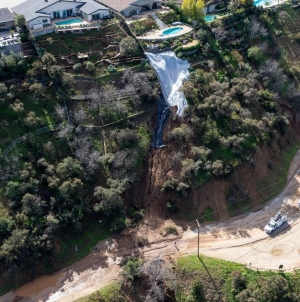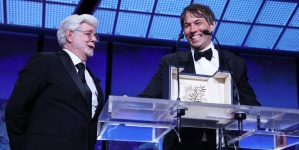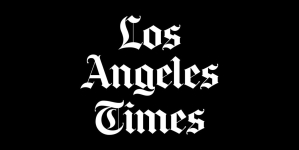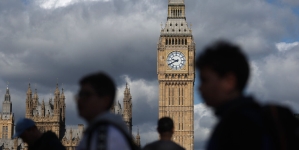-
Nazis in Canada? A Secret List With Answers May Soon Be Released. - October 30, 2023
-
A portion of Mulholland Drive, damaged by mudslides in winter storms, reopens - May 26, 2024
-
‘Maybe You Don’t Want to Win’ - May 26, 2024
-
Donald Trump Putting Law Enforcement in Danger: Attorney - May 25, 2024
-
Avoid the waters of these 5 L.A. County beaches this holiday weekend, public health officials say - May 25, 2024
-
Bawdy Comedy ‘Anora’ Wins Palme d’Or at Cannes Film Festival - May 25, 2024
-
Map Shows Heat Wave Zone Spread Into Five New States - May 25, 2024
-
Azusa police arrest suspected slingshot-wielding vandal - May 25, 2024
-
Donald Trump Hammers Judge Ahead of Jury Instructions - May 25, 2024
-
Sometimes U.S. and U.K. Politics Seem in Lock Step. Not This Year. - May 25, 2024
Nazis in Canada? A Secret List With Answers May Soon Be Released.
For 37 years, Canada has kept close guard on an explosive roster of names.
The classified report lists 883 possible Nazi war criminals who found harbor in the country after World War II, and many believe it offers insights into exactly what the government knew about how they got there, the extent to which they were investigated and why most escaped prosecution.
Canada’s strong privacy laws and government secrecy have kept the report confidential, but a recent political blunder may crack it open.
Last month, Canadian lawmakers used the occasion of a visit by President Volodymyr Zelensky of Ukraine to honor Yaroslav Hunka, a Ukrainian Canadian man who volunteered for the Nazi Waffen-SS, a combat group that also oversaw concentration camps during the Holocaust.
Now, Prime Minister Justin Trudeau’s government is discussing whether the time has come to unseal the report. The deliberations began before the celebration of Mr. Hunka, said Anthony Housefather, a member of Mr. Trudeau’s Liberal Party caucus who has been the primary political proponent of declassification. But the episode has increased pressure on the government to finally act.
Mr. Hunka’s introduction as a “hero” prompted apologies from Mr. Trudeau and from the speaker of the House of Commons, Anthony Rota, who resigned amid the uproar.
In brief remarks to reporters after Mr. Hunka was feted in Parliament, Mr. Trudeau said that “top public servants are looking very carefully into the releasing the secret list, including digging into the archives.”
He added: “We’re going to make recommendations.”
Precisely why the report, the second part of a 1986 inquiry into war criminals in Canada, was classified — even as the first part was released that year — has never been made clear. But some Ukrainian Canadians, whose communities included some former Nazis, bitterly opposed the inquiry, viewing it as a witch hunt and a smear.
The United States has steadily declassified millions of pages of documents related to Nazi war crimes and their perpetrators under a special 1998 disclosure law.
In Canada, Jewish groups and scholars have been seeking the release of the report for decades.
The country has a dismal track record of prosecuting or deporting Nazis who moved there after World War II and blended into the population, largely forgotten.
Of four former Nazis charged by Canada with war crimes and crimes against humanity since 1986, when they became crimes under Canadian law, none were convicted. Prosecutions and deportations failed largely because of problems with evidence.
David Matas, honorary counsel for B’nai Brith Canada, said the honoring of Mr. Hunka, 98, in Parliament further makes clear the need for the report’s release.
“That emphasized the problem of ignorance of the past,” said Mr. Matas, who is also a member of the International Holocaust Remembrance Alliance Monitoring Access to Archives Project. “We can learn from the failures of the past to avoid the repetition. But we cannot avoid the repetition until we know the past — and we can’t know the past until we get the record.”
Mr. Housefather, a member of Parliament from Montreal who is Jewish, said Canada’s disclosure was overdue and could be done without releasing the names of people on the list.
“It’s hard to justify how documents that refer to issues that are 80 to 40 years old could still be classified,” he said. “Civil servants and cabinet and successive governments of both parties admitted Nazi war criminals then largely failed to prosecute them. And then when we did try to prosecute them, we did a terrible job of it. That information has to be clear and it has to be open.”
The episode in Parliament took place after Mr. Zelensky, who is Jewish, addressed a joint session of Canada’s Parliament. Mr. Rota introduced Mr. Hunka as a “hero,” prompting applause and a fist pump from Mr. Zelensky.
The gaffe prompted calls from across the political spectrum for the speaker’s resignation and brought scathing mockery from President Vladimir V. Putin of Russia, who has claimed that his invasion of Ukraine is an effort to “de-Nazify” the nation. Mr. Trudeau apologized, saying that “it was a horrendous violation of the memory of the millions of people who died in the Holocaust.”
In the decades after World War II, rumors swirled that Canada had become a haven for former Nazis.
In response, the report was produced by the Commission of Inquiry on War Criminals in Canada, the country’s first such commission.
It created three secret lists of possible Nazi war criminals who were believed to be living in the country.
After investigating 774 names on the first list, the published portion of the report says that the inquiry found that 448 had never come to Canada or had died by 1986, when the report was published, and it was unable to conclude if four had entered the country.
It found no direct evidence of war crimes involving another 154 people on the list. There was insufficient evidence against 131 people, though, for some, there may have been evidence in other countries, the commission said. The status of 17 people was undecipherable from the public report.
In the course of the inquiry, the commission found other possible suspects and created a second list containing another 38 names, plus a third list of 71 German scientists and technicians who may have been complicit in war crimes. But the commission was required to report its findings before it was able to investigate the people on those two lists.
Ultimately, the commission found substantial evidence of war crimes involving 20 people and made detailed recommendations on how to prosecute them. Those recommendations and whatever steps the government may have taken against those people are in the secret report.
From 1987 to 1992, the government brought multiple charges of war crimes and crimes against humanity against four former Nazis, without yielding a single conviction. One man was acquitted, the charges were dropped in two cases over evidence issues and an aging defendant’s poor health led to the charges in the fourth case being stayed.
Canada also tried to strip 22 former Nazis of their Canadian citizenship and deport them for breaking immigration laws by not revealing their pasts.
A record compiled by Mr. Matas of B’nai Brith shows that there was just a single deportation. Two men voluntarily left and two others were not in Canada at the time they were ordered deported.
The vast majority of the deportation cases were closed following the deaths of the former Nazis.
Michael Levitt, the president and chief executive of the Simon Wiesenthal Center for Holocaust Studies, said any surviving possible war criminals named in the document would now be very old, but should still be held to account.
“Is it fair to press these issues when someone’s 98?” he asked. Holocaust survivors deserve accountability, he said, and “we owe it to them to pursue justice.”































